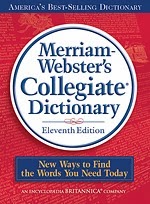By Elaine Viets
“He knelt in church.”
The Penguin copy editor had changed that sentence in my manuscript to “He kneeled in church.”
What?
That couldn’t be right. Copy editors have saved my bacon many times. Like the book where my character drove to an apartment, then walked home. I was grateful to the copy editor who mentioned I’d abandoned a car.
But this was different. In high school, Sister Grace Edmund had taught me that the past tense of “kneel” was “knelt.” If anyone knew about kneeling in church it was a nun.

Publishers adopt odd style quirks, like spelling out 911. And they were good at catching my mistakes. But kneeled was plain wrong.
I needed to appeal to a higher power.
I found it in my big red Merriam-Webster’s Collegiate Dictionary.

Yes, I know there are online dictionaries. When I find Mr. Webster too stodgy, I’ve flirted with the Urban Dictionary. But I still find solid comfort in the 1,626 pages of Webster.
Words should have weight as well as purpose. To me, a fat dictionary is reassuring.
On page 1624, it says, “Merriam-Webster’s Language Research Service offers owners of Merriam-Webster’s Collegiate Dictionary the opportunity to take advantage of the editorial resources of America’s foremost dictionary publisher – at no cost. If you have a question about a particular word, such as who first used it or why it has not been entered in the dictionary, an inquiry to the Language Research Service will bring an accurate and concise reply from a Merriam-Webster editor – a member of the largest permanent staff of lexicographers in America.”
The dictionary said I could either e-mail or send a self-addressed stamped envelope. I was on deadline. The manuscript was due. I send this e-mail, confessing my problem:
“I am a mystery writer for the Penguin Group in New York. My publisher’s style for the past tense of kneel is ‘kneeled’, as in, ‘He kneeled in church’.
I prefer ‘knelt’ and find ‘kneeled’ irritating. Am I old-fashioned and out of date? If ‘kneeled’ is the preferred style now, then I will learn to live with it.”
Four days later, I got this response from Paul Wood, an assistant editor at Merriam-Webster. He said,
“Knelt is the more common variant for the past tense and past participle forms of kneel. You are not old-fashioned or out-of-date in your preference for knelt. In fact, knelt is a relatively new addition to the English language. While kneel has been a part of the language since before the late 12th century, the past tense and past participle knelt does not appear to have been used until the late 19th century.”
Mr. Wood’s words were comforting. I’ve bowed to my publisher’s old-fashioned ways. I even kneeled.



While annoying, this is a relatively minor change, and it doesn’t hurt too much to succumb to the editor’s will. But sometimes we have to fight for what we believe is right, and then documentation like you did can help to prove our cause. I had to do that once when an copy editor changed I-95 to the spelled out version.
Errgh! I hate when publishers spell out interstates. Glad you fought it, Nancy.
I have a few pet peave words when it comes to copy editors. I tend to use leapt & would have used knelt as well. But the one I hate the sound of is “shone.” It doesn’t sound like a natural way to speak. I shone the light, for example. I usually write “shined.” I’ve never used shone when speaking or thinking it, so neither do my characters in their internal thoughts. Maybe part of the issue is regional influences.
I understand a publisher’s need for a certain style of wording for uniformity’s sake, but I’ve dug my heels in with certain suggestions and would rather reword than use an unnatural sounding word to my ear. Glad to hear I’m not alone.
“I understand a publisher’s need for a certain style of wording for uniformity’s sake,”
Please explain it to me. Does any reader really care if one MacMillan book (to choose a publisher at random) uses “kneeled” and another “knelt?” For readers, it’s the author who carries the brand. I doubt most of them could tell you who published their favorite authors.
Don’t let them shine you on, Dana. I’ve never heard anyone say “shone” either.
Dana, you’d be amazed what readers notice. NAL style for chaise lounge is “chaise longue.” It’s technically correct, but I get letters from readers when I use it in a book. Two books ago, I started saying “chaise” — style was statisfied and the letters stopped.
Elaine, no argument there. My question has to do with the publisher’s style sheet. Let’s say you and I are both published by the same publisher. Will any reader really care that you use “kneel” and I used “knelt” and think “Wow, I’m not buying any more of Publisher X’s books; they’re inconsistent in their grammar.
Wish you hadn’t given in, especially with M-W on your side. I like “knelt” much better, while “kneeled” made me stop and frown.
It was one of my weak moment, Richard. I still like “knelt.”
I’ve always felt comfortable with using them consistently as such:
She kneeled at the alter to pray.
They knelt before the King.
He dreamed he was floating.
They dreamt of sugar plums.
I’m not sure what makes me prefer one over the other. I guess it’s in the way it sounds when I read it in my head. lol
Glad you brought this up. Now I won’t feel terrible biting my nails over which to use. But I will wonder if I won’t get called out for inconsistencies. 😀
Inconsistencies always seem to escape the publisher’s watchful eyes. A reader will catch you for sure, Diane.
I think I’m missing something, Elaine. You went to a higher authority and got confirmation of your position. Did you sent this to your editor? Did you make a play for knelt? Like Dr. Mabry, I prefer it.
BTW, it’s nice of M-W to offer that service. Shows somebody still cares about the language.
I know, but I was fighting for the ending I wanted. Like Nancy said, sometimes you have to pick your battles.
I’m with the knelters on this one, Elaine. And I repeat the William Zinsser quote I posted here a couple days ago. “People read with their ears, whether they know it or not.” Kneeled is like a screech on the page.
Yep, it’s fingers on blackboards, Kris. For me, words are like music and some people are tone deaf.
Yes! Exactly!
Has anyone ever insisted on reading bad poetry out loud to you? It’s physically painful.
It’s why I’ not a poet, Loretta. My first — and last — poem began, “Oh flag in the sky, waving so high, guarding the land of the free . . .”
I hear you screaming. I’ll stop now.
That’s not so bad. You’ve got meter and your rhymes are real rhymes. 🙂
Sometimes it’s a matter of British common usage and North American common usage. For example, Brits often use “spelt” for “spelled” as in “She spelt it correctly.” (Not sure if that’s a regional UK usage or not…?)
Here’s a regional question for you Jodie, I’ve narrated some Canadian author’s works where the spellings were more British (as in colour v. color), others that matched American style spelling. What is the norm in Canada? Or is there a specific Canadian spelling?
Basil, it depends on how the Canadian was taught. If the parents were Brits . . .
Theresa
Basil, there are only a few differences in Canadian spelling, like the “our” for labor (labour), neighbor, color, etc. We also use “re” for “er” in cases like theatre, metre, etc. Mainly we go with American idioms, spelling and usage over British.
And I love my Merriam-Webster’s Collegiate Dictionary and my Chicago Manual of Style!
Hear, hear for the M-W. I cut my cub reporter teeth on the Chicago Manual of Style.
When my dad-in-law died — he was a gentleman and scholar — I inherited his old Oxford English Dictionary. It weighs like 20 lbs and comes with a magnifying glass. (Thank God he didn’t own the FULL version which takes up 4 feet on a shelf and weighs more than I do). I still drag the thing out once in a while for fun. Somehow, all the Wiki-Dics on online just aren’t the same…
I used to read the Old Oxford at the public library for fun, Kris. A treasure trove. I envy you your inheritance.
I’m with you on knelt – kneeled looks too much like keeled – he keeled over in church…hmmm…I’m always in trouble as I use the British/Australian spelling and usage and sometimes I’m like ‘say what?!’. My pet peeve is ‘dove’ – really? – not dived. Is that legitimate or just bad grammar?? I love how MW responded though!
Dove is bizarre, Clare, but nobody ever claimed English was logical.
What I like about the Merriam-Webster’s Collegiate Dictionary is the dating of when the word came into use, “knelt does not appear to have been used until the late 19th century.” I read that and thought you knelt to your publisher’s old fashioned ways because your work pre-dated the word.
Jeez,AC, my writing isn’t that old.
Elaine,
I guess my questions for your editor would be, “Am I writing this story for a medieval audience or a modern one? What other words am I using that weren’t around at the time my story takes place? Do I have to use Old English in order to tell this tale?”
Also, for Jordan, I use “shined” when my character is shining a light, but “shone” when the light is doing the action, like: The light shone in the trees above them.
Good question, Gordon, and I wished I’d thought of it.
Elaine– Uninformed by nun-related expertise, all I would add is this: given that both versions are correct, which sounds better? Anyone who is not tone-deaf will answer “knelt.”
I agree, Barry. But this was a case of might is right.
If you had to choose with an oldtime nun (enforcer) around, you’d go her way or possibly get cracked with a ruler!
In word choice it seems to me that the adage “the truth is no excuse in fiction” might apply. Kneeled may be technically “right’ but knelt is what works.
Another case where ‘right’ and what sounds/feels right conflicts is use of ‘startled’ vs. “started”
Fun post – thanks!
Glad you liked it, Tom. The nuns never hit me with rulers. They walloped the boys.
Many peoples want to earn money on internet without any investment but there is many online jobs which have many investments. Now you can earn without any investment with Just clicking and Earn daily upto 10 Dollars.
Join this Best opportunity to make money online without any investment or Charges.
HotProClicks.com